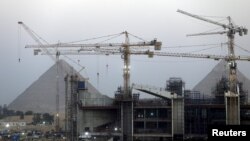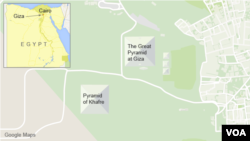Gunmen on a motorbike shot and killed two policemen Wednesday, near Egypt's iconic pyramids. The attack came a day after a hearing to confirm death sentences against top Muslim Brotherhood leaders was postponed by a Cairo court.
The shooting took place in broad daylight in an area teeming with activity, near Egypt's iconic grand pyramids in Giza. Witnesses said three assailants opened fire on members of Egypt's tourist police, killing one instantly. A second officer died at a local hospital. The gunmen fled on their motorbike.
Islamic militants and opponents of the Egyptian government have been waging a low-level street war against members of the police and military since Islamist President Mohamed Morsi was toppled in July 2013 by the army, following large street protests against him.
Most of the violence against government targets has taken place in Egypt's northern Sinai region, where militants have attacked police and army compounds, checkpoints, and military convoys, killing dozens. Sporadic attacks on police and army targets in Cairo and elsewhere have also prompted tighter security and more arrests of suspected militants.
Muslim Brotherhood trial
Tuesday, an Egyptian court postponed a decision on whether to uphold death sentences against top Muslim Brotherhood leaders in several high profile cases.
Egyptian President Abdel Fatah el-Sissi is on a state visit to Germany, where he said Egypt's judiciary followed international norms and many of those sentenced to death were tried in absentia and would be retried if arrested.
Sissi also said that on the day of Morsi's ouster a statement was issued which "did not hurt or harm a single Egyptian, and the chance was given to everyone to participate in a new political process, and we never imagined entering into violence against each other for several years."
Calls for violence
Calls for violence against the Egyptian government, military, police and judiciary have been frequent on Facebook, Twitter and various Islamist-leaning satellite TV channels in the months since Morsi was ousted.
In a recent interview on a Turkish-funded satellite channel, Islamist Egyptian attorney Mohamed Awad justifies the toppling of the Sissi government, claiming the judiciary and other branches of power are illegitimate, and alludes to using violence to achieve that end.
Despite sporadic violence in parts of the country, Egyptian security forces have largely kept a lid on high profile attacks and terrorist activity in recent months. Minor explosions have targeted police and judiciary officials and infrastructure targets like electricity pylons and rail lines, causing minor damage.





